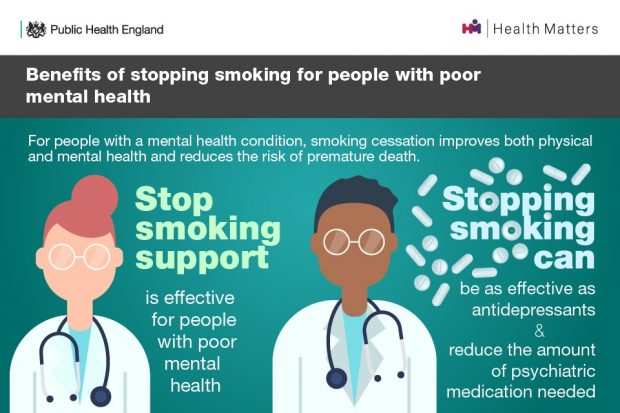
Everyone knows smoking is very bad for physical health. But what about its impact on mental health? Many smokers believe that smoking helps to relieve stress, anxiety and low mood, when in fact the opposite is true. Today, for the first time, the national No Smoking Day campaign will focus on the significant benefits of quitting for mental health and wellbeing. This is the start of a new conversation that feels particularly relevant as we set our sights towards the national recovery from COVID-19.
New data analysis published by Public Health England shows the strong association between smoking and poor mental wellbeing. In surveys by the Office for National Statistics, smokers score worse than the population as a whole on every mental wellbeing indicator.
As COVID-19 has taken its toll, levels of mental wellbeing have worsened and smokers have been particularly hard hit. In 2019, more than a quarter of smokers in England reported having high anxiety (an estimated 1.6 million people) compared with 20% of non-smokers and 14% reported low happiness (900,000 people) which is double the proportion of non-smokers. In 2020, these figures rose to 38% of smokers (2.4 million people) reporting high anxiety and 21% (1.3 million people) reporting low levels of happiness compared with 34% and 12% of non-smokers respectively. Reported levels of low life satisfaction and low self-worth among smokers have also increased substantially.
What smokers perceive as relief from feelings of anxiety, stress and low mood is actually the effects of a vicious circle – the tobacco withdrawal cycle. Smoking interferes with chemicals in the brain and when a smoker hasn’t had a cigarette for a while, the craving for another one makes them feel irritable and anxious. These feelings can be temporarily relieved by the next cigarette, after which the cycle starts all over again.
The benefits of quitting smoking for mental health and wellbeing are set out in a new Cochrane review published this week. It updates a meta-analysis from 2014 looking at what happens to people’s mental health when they have quit, once they have passed the stage of withdrawal.
The authors found that compared with people who continued to smoke, people who stopped smoking showed greater reductions in:
- anxiety (evidence from 3141 people in 15 studies);
- depression (7156 people; 34 studies); and
- mixed anxiety and depression (2829 people; 8 studies).
Compared with people who continued to smoke, people who stopped smoking showed greater improvements in:
- symptoms of stress (evidence from 4 studies in 1792 people);
- positive feelings (13 studies; 4880 people); and
- mental wellbeing (9 studies; 18,034 people).
The improvements were seen across all groups, including those diagnosed with a mental health condition. This is important, given that people with mental health conditions are more likely to smoke than the general public and smoking rates increase with the severity of illness.
The evidence indicates that benefits to mental health can be seen as soon as six weeks after stopping smoking and are maintained even a number of years afterwards. Reductions in anxiety and depression in those who quit smoking are found to be at least as great as from taking antidepressants.

It’s time to share with people who smoke that quitting can make them not only healthier, but also happier. With the theme “Quitting smoking doesn’t have to be stressful”, No Smoking Day 2021 acknowledges the valid concerns smokers have about the quitting process itself, pointing them to the evidence-based support that will help get them through. It uses case studies of ex-smokers who can talk about the mental health benefits of becoming smokefree to help bust the myths that have persisted for far too long.
The mental health impact of COVID-19 is becoming increasingly evident. Building back better encompasses many challenges, not least of which will be restoring the mental resilience of the population. Carrying out to people who smoke the message that far from being a crutch to help them manage the stresses and strains in their lives, smoking is a shackle that is holding them back, is a good starting point.
